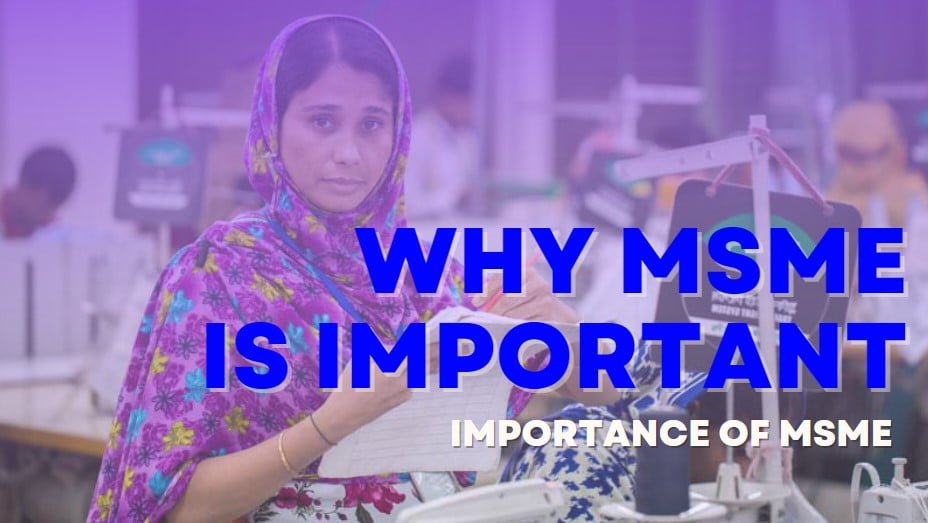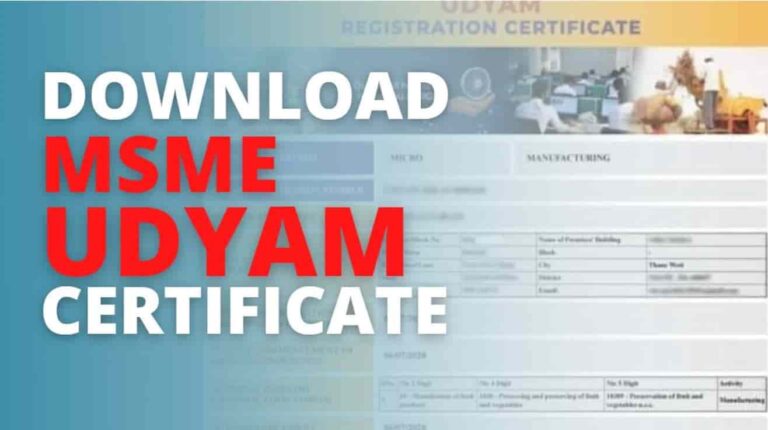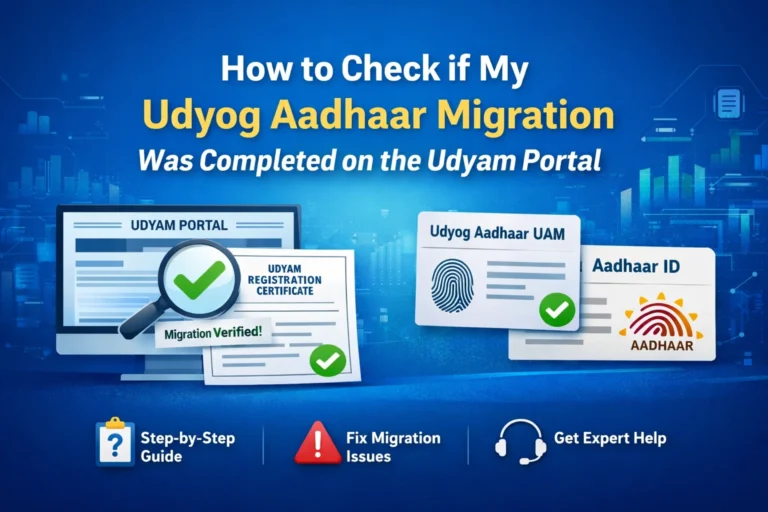Let us understand Why MSME is important in India. MSME was first made available in India in 2006. Recently, the definition of an MSME under this Act underwent a significant change. It now includes some service sectors that were not previously considered part of this sector.
Therefore, the government is utilising the potential of this industry by streamlining online MSME registration through paperless work.
MSME are crucial to the economy’s future. MSME will aid in constructing a new India. To aid India’s development, support MSME.
All of these claims are often read and discussed. We have all had numerous encounters with these discussions. Ever questioned how MSME became so well-liked? Ever wonder if MSME is indeed a gem or just a bureaucrats’ overblown idea?
Therefore, in order to comprehend the significance of MSMEs, it is vital to grasp what they are. Anyone can do this by simply reading the whole new definition of MSME Micro, Small and medium-sized enterprises.
Up until recent decades, only large corporations provided for and supported the Indian economy. The main problem with this practice is that only a small portion of society profits from it. By providing opportunities to even smaller, smaller, and mid-sized organisations, MSME fills this gap and benefits every sector of society.
MSME are crucial to the economy’s future. MSME will aid in constructing a new India. To aid India’s development, support MSME. All of these claims are often read and discussed.
Why MSME is important?
The Micro, Small, and Medium Enterprises (MSME) sector has grown to be a vibrant area of the Indian economy over the past five years. MSME contributes significantly to the creation of jobs at a relatively cheap capital cost, and it also aids in the industrialization of rural and underdeveloped areas. As a result, this thriving sector has lessened regional inequalities, ensuring a more equitable distribution of wealth and income across the country. They occasionally provide secondary contributions to the major industries.
For Economy
Every sector of the economy must expand and develop simultaneously for the economy to prosper. The purpose of the Ministry of MSME is to boost industries, start-ups, artisans, and farmers that lack the financial and technological clout of other major industrial sectors. The MSME highlights from the Ministry of MSME’s Annual Report 2019–20 are listed below.
- a lot of jobs available at a cheaper cost than in huge industries
- According to the 73rd wave of the National Sample Survey, MSME has generated roughly 11.10 crore jobs nationwide (2015-16)
- Credit Support through the credit-linked capital subsidy programme and the prime minister’s employment generation programme (pMEGp)
- Promotion of skill development: These programs/organizations trained 2,69,005 people
For Entity
Many small business structures are now eager to register under the MSMED Act. When a company is registered as an MSME, there are many advantages. Below are a few that stand out:
High Priority to Companies – The Indian government is constantly attempting to support MSME. MSME’s are therefore given first consideration and will continue to gain from this.
Employment Generation – In this industry, inclusive businesses require little startup capital. In actuality, it offers a tonne of opportunities for the unemployed. India produces about 1.2 million graduates per year, making it challenging for any economy to hire this many new graduates in a single academic year. The gift to young Indian talent is MSME.
Easy Financial Assistance – By providing loans to key sectors, banks must complete their lending profile. As a result, banks lend money to MSMEs with ease. The government has also created a number of programmes to help MSME financially.
Like the Interest Subsidy Eligibility Certificate (ISEC), the Credit Guarantee Trust Fund for Micro & Small Enterprises (CGTMSE), etc.
Working Capital Facility – Small start-up businesses frequently experience financial strain when it comes to funding their daily operations. However, MSME’s have access to a simple discounting option through the TREDS platform. TREDS is an online platform that offers financing for MSME trade receivables from corporations and other purchasers, including as government agencies and public sector enterprises (PSUs), using a variety of financiers, including banks.
Training Facility – The Ministry is running a number of training institutes to boost the MSME sector in India. These institutes provide skill-based training so that graduates can support themselves on their own. There are 18 technology centres that are now in operation, some of them are located in the Indian states listed below.
Career Opportunity – To expand the skill pool and make it possible for skilled youth to learn about various employment prospects, the Ministry of MSME has created an online platform. A digital platform called MSME Sampark allows both employers looking to hire skilled workers and job seekers to register. Job seekers are essentially recently graduated trainees and students from MSME technology centres and institutes.
Restrictions on procurement – Under the Public Procurement Policy for Micro and Small Enterprises (MSME) Order 2012, every Central Ministry, Government Department, and Public Sector Undertaking (PSU) is required to acquire at least 25% of their yearly purchases from MSME. (In the aforementioned 25%, there is a minimum 3% reservation for MSEs controlled by women.) Therefore, the government makes reservations to provide more support for MSME.
Grievance Redressal – In order to protect MSME’s interests over their delayed payments, the government established the Micro and Small Enterprises Facilitation Council (MSEFC), which resolves MSME’s complaints. These MSEFC are tasked with finding a cooperative solution for MSME’s and resolving issues regarding delayed payments to MSME’s. Micro and Small Enterprises Facilitation Council has been established in 36 states and UTs.
Payment Protection – MSE has the authority to notify the Micro and Small Enterprises Facilitation Council of their concern with delayed payments under section 18 of the MSMED Act 2006 (MSEFC). Buyer would be responsible for paying compound interest with monthly rest on the amount due, calculated from the designated day at three times the rate notified by Reserve Bank of India, if buyer fails to make payment within the allotted time frame of 45 days.
Additionally, the Ministry of Corporate Affairs has announced that companies that have fallen behind on payments to MSME must complete an MSME Form every six months.
Intellectual Property Rights – In order to increase the MSME sector’s competitiveness, a programme called “Building Awareness on Intellectual Property Rights (IPR)” for MSME has been developed. This programme also offers financial help for MSME to file applications for IPR protection.
Economic stability in terms of Growth and Leverage Exports – MSME contributes 8% of the GDP in terms of growth and exports, which indicates economic stability. Given that MSME’s contribute to production, exports, and employment, many industries profit from this. MNCs also purchase from small enterprises semi-finished and auxiliary goods, such as clutches and brakes from automakers. Establishing a relationship between MSMEs and major businesses is crucial. Even after the GST was adopted, 40% of the MSME sector implemented GST registration, which significantly increased government revenue by 11%.
Promotes Inclusive Growth – For many years, the Ministry for MSME has placed a priority on inclusive growth. On the other hand, India’s development is hampered by poverty and destitution. Additionally, this encompasses socially excluded groups, who present a challenge for the MSME ministry.
Low Overhead And Inexpensive Labor – Even in large organisations, one of the biggest challenges is to maintain the human resource with a qualified HR manager. However, the requirement for labor in MSME is much reduced, and a highly skilled worker is not required. As a result, the owner’s indirect costs are similarly minimal.
Simple Management Structure for Enterprises – Small resources under the owner’s control can be used to start an MSME with a simple management structure. Its scale allows it to make decisions quickly and effectively. On the other hand, a huge corporation requires a specialist due to its intricate organisational structure. A Micro & small business, however, does not require the management services of an outside expert. Owner is free to maintain self-control. It might then function independently.
Support for Make in India – Support for Make in India has been made easy via MSME, the prime minister of India’s flagship campaign. It is thought to be the backbone that will make this vision a reality. The government has additionally directed the banking institution to provide greater credit to MSME-sector businesses.
Given what has been said so far, it is obvious that MSME is not a hyped issue and is essential to India’s future since it has the potential to strengthen the economy and reduce social inequities.
Why MSME Registration is important ?
The Micro, Small and Medium Enterprises Development (MSMED) Act was introduced in 2006 as a policy to address the problems impacting MSMEs. The Act is the first-ever legislative foundation for enterprise recognition. This means that the State governments, with assistance from the Central, are primarily responsible for promoting and developing these businesses. There are numerous initiatives and programmes that can only be accessed with MSME Registration.
- Encourage entrepreneurship by ensuring that banks and financial institutions are providing enough credit. All banks and financial institutions support MSME commercialization through programmes that they all recognise. to maintain the tax advantages enjoyed by MSME during their early years of operation, such as the exclusion from excise taxes and from payment of some direct taxes.
- Support for infrastructural improvements and technological advancement
- Opportunities for employment: facilities for skill development, capacity building, and training.
- Opportunities for work that support artisans and laborers
- Access to the domestic and international markets as well as assistance with product development.
MSME Registration Process
The registration process enables new entrepreneurs to enter this market while also enabling MSMEs to access large-scale enterprises. MSME registration is not a difficult process because there are relatively few documents needed for it.
Follow this step to register your business under the MSME.
Step 1: The first step is to go to the Udyam registration portal at udyamregistrationform.com.
Step 2: Complete the MSME Udyam Registration Application form correctly in 2nd step.
Step 3: Pay the online service cost in the third step.
Step 4: A manager will start the MSME Udyam registration procedure.
Step 5: A few business hours after registering, you will receive an Udyam registration number and Udyam Certificate at your registered email address.
An OTP will be given to you during the procedure, which you must present to our executive in order to continue.
If you have already registered under the msme, go to https://udyamregistrationform.com/udyog-aadhar-to-udyam/ to convert your Udyog Aadhar certificate to an Udyam certificate.
Documents Required for MSME Registration
Now if you are ready to register your business under the ministry of msme, allocate these documents first to do msme udyam registration online.
- Aadhaar Card Number
- PAN Card Number
- Mobile Number linked to Aadhar card
- Bank Details
It is crucial to remember that the authorized person’s Aadhaar card is crucial. And it should be linked to your current mobile number.
Are you self-assured and motivated enough to register an MSME in India?
Please click on the following link to contact one of our advisors. Udyam registration center will assist you in obtaining all necessary certification needed to obtain MSME Registration.




